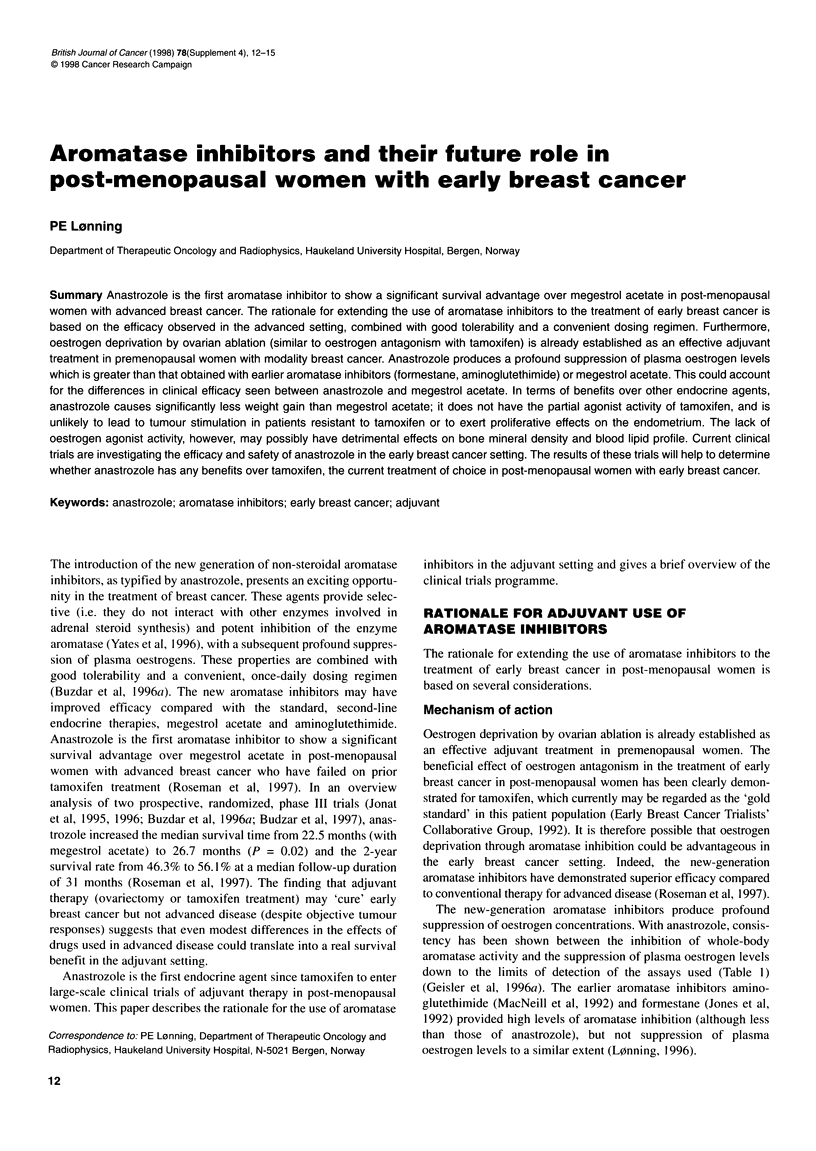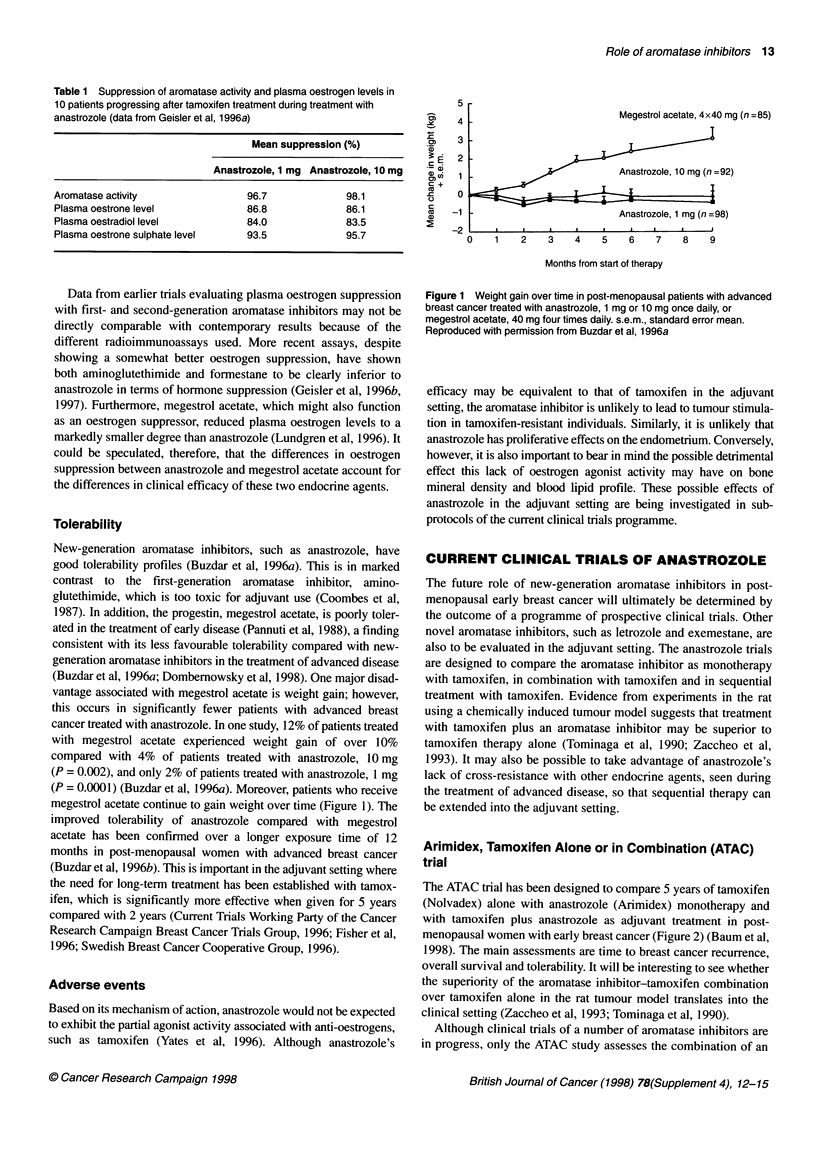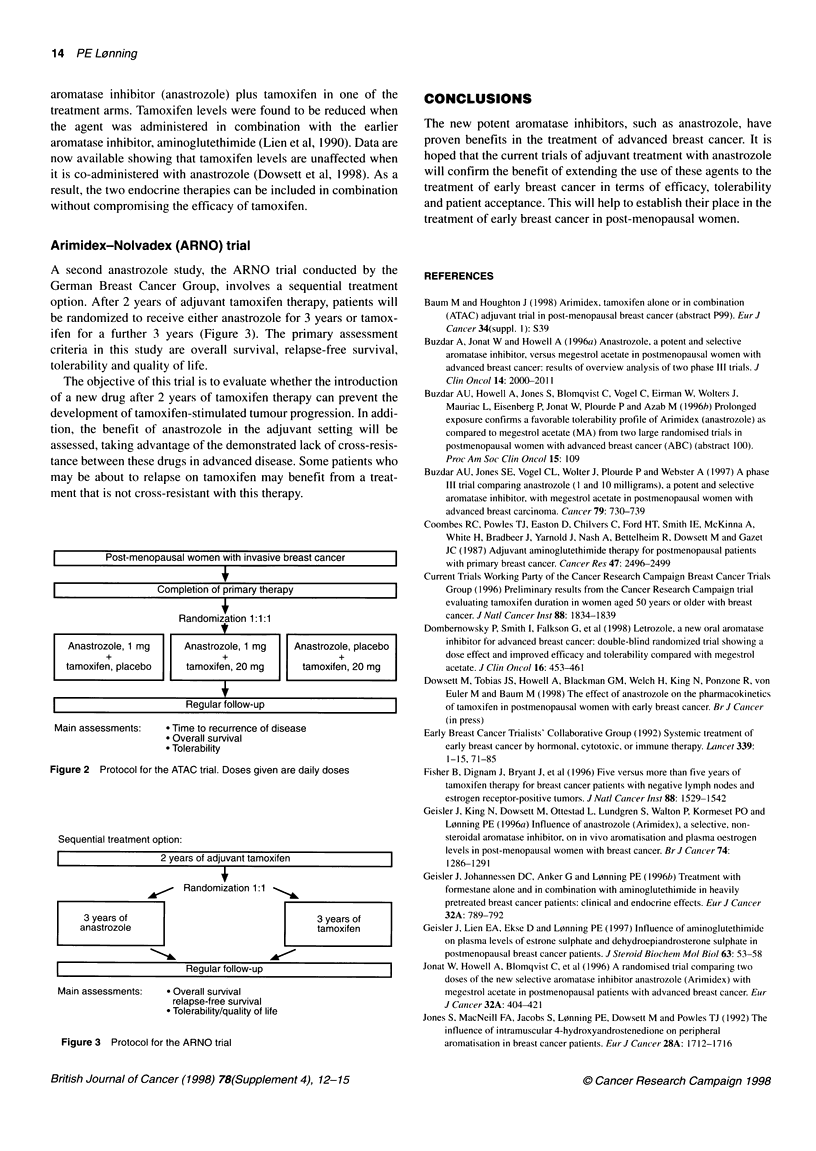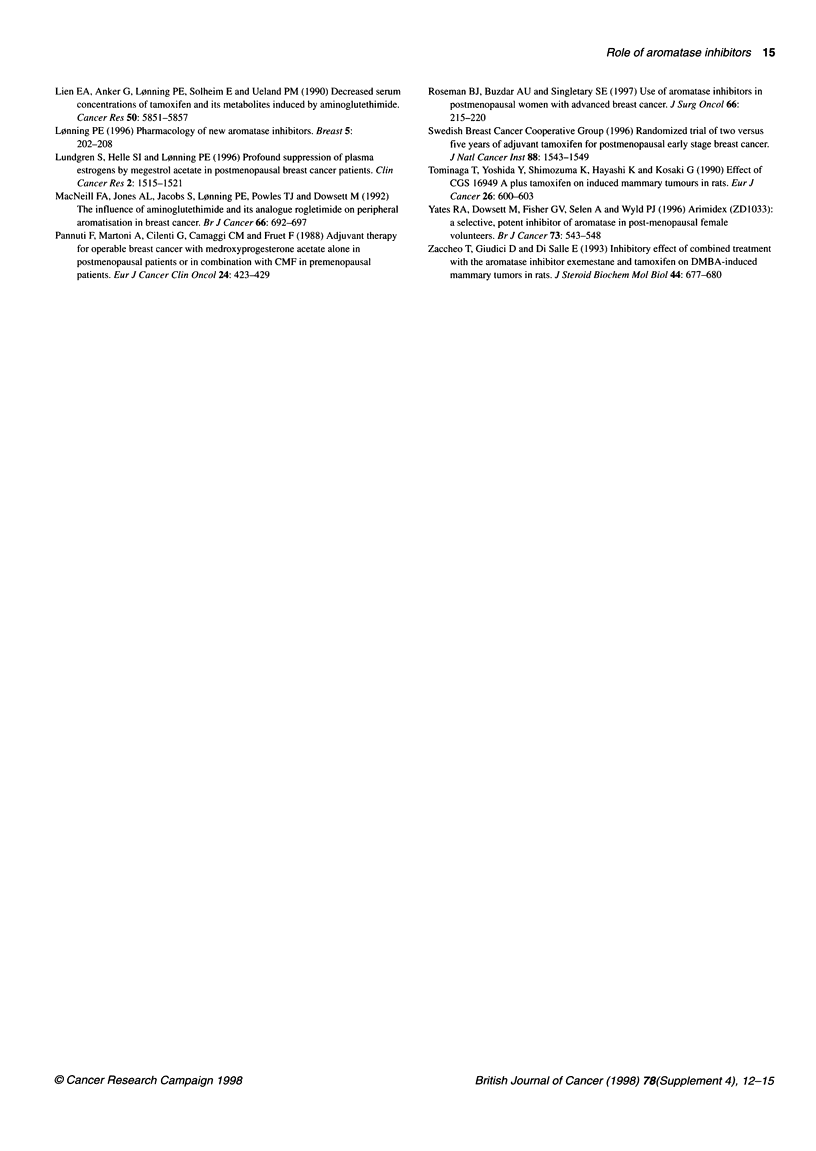Abstract
Anastrozole is the first aromatase inhibitor to show a significant survival advantage over megestrol acetate in post-menopausal women with advanced breast cancer. The rationale for extending the use of aromatase inhibitors to the treatment of early breast cancer is based on the efficacy observed in the advanced setting, combined with good tolerability and a convenient dosing regimen. Furthermore, oestrogen deprivation by ovarian ablation (similar to oestrogen antagonism with tamoxifen) is already established as an effective adjuvant treatment in premenopausal women with modality breast cancer. Anastrozole produces a profound suppression of plasma oestrogen levels which is greater than that obtained with earlier aromatase inhibitors (formestane, aminoglutethimide) or megestrol acetate. This could account for the differences in clinical efficacy seen between anastrozole and megestrol acetate. In terms of benefits over other endocrine agents, anastrozole causes significantly less weight gain than megestrol acetate; it does not have the partial agonist activity of tamoxifen, and is unlikely to lead to tumour stimulation in patients resistant to tamoxifen or to exert proliferative effects on the endometrium. The lack of oestrogen agonist activity, however, may possibly have detrimental effects on bone mineral density and blood lipid profile. Current clinical trials are investigating the efficacy and safety of anastrozole in the early breast cancer setting. The results of these trials will help to determine whether anastrozole has any benefits over tamoxifen, the current treatment of choice in post-menopausal women with early breast cancer.
Full text
PDF



Selected References
These references are in PubMed. This may not be the complete list of references from this article.
- Buzdar A. U., Jones S. E., Vogel C. L., Wolter J., Plourde P., Webster A. A phase III trial comparing anastrozole (1 and 10 milligrams), a potent and selective aromatase inhibitor, with megestrol acetate in postmenopausal women with advanced breast carcinoma. Arimidex Study Group. Cancer. 1997 Feb 15;79(4):730–739. [PubMed] [Google Scholar]
- Dombernowsky P., Smith I., Falkson G., Leonard R., Panasci L., Bellmunt J., Bezwoda W., Gardin G., Gudgeon A., Morgan M. Letrozole, a new oral aromatase inhibitor for advanced breast cancer: double-blind randomized trial showing a dose effect and improved efficacy and tolerability compared with megestrol acetate. J Clin Oncol. 1998 Feb;16(2):453–461. doi: 10.1200/JCO.1998.16.2.453. [DOI] [PubMed] [Google Scholar]
- Geisler J., Johannessen D. C., Anker G., Lønning P. E. Treatment with formestane alone and in combination with aminoglutethimide in heavily pretreated breast cancer patients: clinical and endocrine effects. Eur J Cancer. 1996 May;32A(5):789–792. doi: 10.1016/0959-8049(95)00623-0. [DOI] [PubMed] [Google Scholar]
- Geisler J., Lien E. A., Ekse D., Lønning P. E. Influence of aminoglutethimide on plasma levels of estrone sulphate and dehydroepiandrosterone sulphate in postmenopausal breast cancer patients. J Steroid Biochem Mol Biol. 1997 Sep-Oct;63(1-3):53–58. doi: 10.1016/s0960-0760(97)00071-x. [DOI] [PubMed] [Google Scholar]
- Jones A. L., MacNeill F., Jacobs S., Lonning P. E., Dowsett M., Powles T. J. The influence of intramuscular 4-hydroxyandrostenedione on peripheral aromatisation in breast cancer patients. Eur J Cancer. 1992;28A(10):1712–1716. doi: 10.1016/0959-8049(92)90074-c. [DOI] [PubMed] [Google Scholar]
- Lundgren S., Helle S. I., Lonning P. E. Profound suppression of plasma estrogens by megestrol acetate in postmenopausal breast cancer patients. Clin Cancer Res. 1996 Sep;2(9):1515–1521. [PubMed] [Google Scholar]
- MacNeill F. A., Jones A. L., Jacobs S., Lønning P. E., Powles T. J., Dowsett M. The influence of aminoglutethimide and its analogue rogletimide on peripheral aromatisation in breast cancer. Br J Cancer. 1992 Oct;66(4):692–697. doi: 10.1038/bjc.1992.339. [DOI] [PMC free article] [PubMed] [Google Scholar]
- Roseman B. J., Buzdar A. U., Singletary S. E. Use of aromatase inhibitors in postmenopausal women with advanced breast cancer. J Surg Oncol. 1997 Nov;66(3):215–220. doi: 10.1002/(sici)1096-9098(199711)66:3<215::aid-jso11>3.0.co;2-0. [DOI] [PubMed] [Google Scholar]
- Tominaga T., Yoshida Y., Shimozuma K., Hayashi K., Kosaki G. Effect of CGS 16949A plus tamoxifen on induced mammary tumours in rats. Eur J Cancer. 1990;26(5):600–603. doi: 10.1016/0277-5379(90)90087-a. [DOI] [PubMed] [Google Scholar]
- Zaccheo T., Giudici D., Di Salle E. Inhibitory effect of combined treatment with the aromatase inhibitor exemestane and tamoxifen on DMBA-induced mammary tumors in rats. J Steroid Biochem Mol Biol. 1993 Mar;44(4-6):677–680. doi: 10.1016/0960-0760(93)90280-a. [DOI] [PubMed] [Google Scholar]


